#another spontaneous meta after I watched Blade Runner 2049 today
Explore tagged Tumblr posts
Text

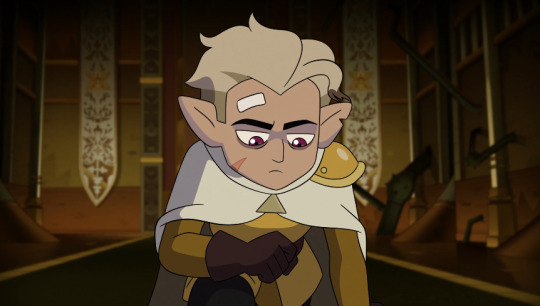
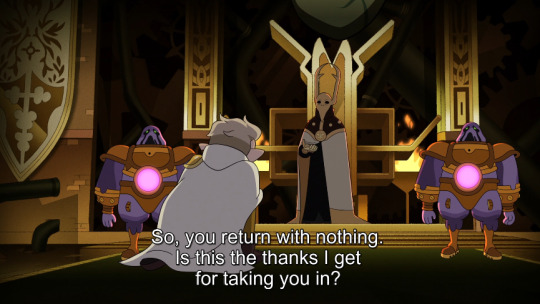
As Hunter puts the work in to recover and heal, looking back on Belos's 'kindness' in offering him a staff, taking him in, and providing the opportunity to be special as the Golden Guard...will be confusing and will involve seemingly conflicting emotions.
Having that treatment from his 'uncle' was the only reference point of feeling loved, while experiencing terror deeper down. This lasted for years before he met Luz and co.
He has overall spent less time in the new framework of healthy found family, than the years in the Castle.
I was looking at scenes from a couple of movies - the Black Widow movie and also Blade Runner 2049 (spoilers for both movies ahead, obviously) - as psychology references to see how two other fictional characters recalled their confusing but significant memories.
These examples carry some big concepts, one of which is that we "recall with our feelings". Not with pure impersonal logic that neatly trims away false info and discards it. If only it were that easy to dust our hands clean this way when healing from trauma.
In Black Widow, Yelena is the character who wears her heart on her sleeve the most, like Hunter naturally does. When confronted with the revelation that her happy childhood was staged, naturally Yelena feels betrayed:

(the GIF file for above was too big so lol I just screencapped a still frame from it)
But she quickly makes a conscious decision on how she wants to view those good memories, when hearing her sister Natasha saying it was all fake. This is perhaps her most important line in the movie:
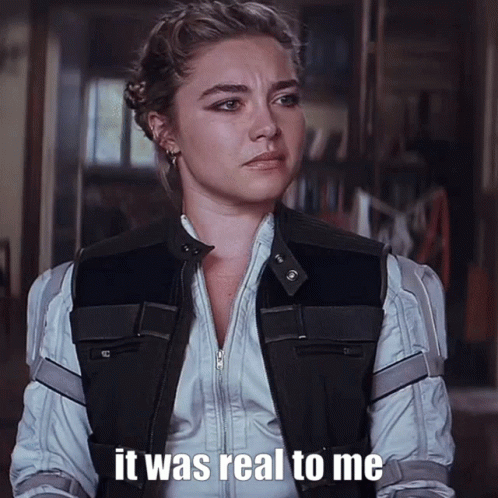
She still chose to believe it had all been real. She is actively claiming the meaning that her good childhood had provided for her. Choosing what kind of lens she'd like to view those memories through. Defending that good meaning. Because her life fell apart after that good childhood came to an end. She could choose to say it was all fake, if she wanted to see it as fake.
She confronts Melina, her (staged) maternal figure who obviously isn't her biological or even a proper adoptive mother, and says: "You are my mother. You were my real mother, the closest thing I ever had to one."
When it comes to Hunter, he wouldn't find it as straightforward to acknowledge that the times when Belos was nice to him "felt real". Would he ever want to view the late Emperor as his uncle? Not via any conscious decision, I'm sure...since he's the opposite of Yelena here. Hunter's safe haven was after he escaped the Emperor's Coven, but Yelena's haven was at the start of her life, which she wished had been permanent.
Those months of summer when Hunter spent time away from Belos in the human realm must've been so special for him. But when faced with inevitable confusing flashbacks especially after Belos's death (that involve the subconscious, not conscious, part of his mind), he's still going to feel that the Emperor was a close family member whom he had an attachment with. Belos was the closest thing he ever had to family for so long.
In the Black Widow example, Yelena felt that Melina was her mother, from an early age. Around two decades later in her young adulthood, she still feels that this is the case, and consciously still wishes for that. She was lucky to be able to reconcile with Melina in the movie.
Hunter isn't as lucky. While he recovers, I don't think he can simply dismiss what it felt like to be told that he is part of a family (even if it was a lie) in such fragile formative years:
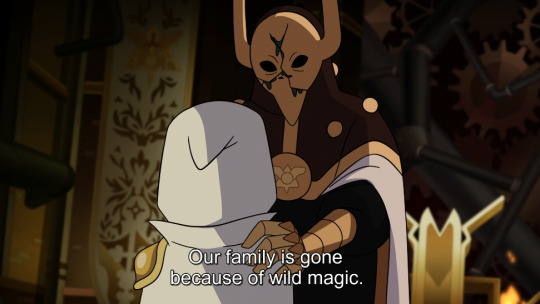

As an example, if I had first been told at age 5 by a parent that they promised to protect me, only to find out a decade later that they actually wouldn't have ever cared if I died...I would be hella confused.
Quoting a guest lecturer from my first year of therapist training, the part of our brains responsible for reasoning and logic - the prefrontal cortex - does not begin to seriously mature until our late teen years. Which is why early childhood memories can't just be viewed by our adult selves and easily trimmed away and viewed in black-or-white as truth-or-lie. Those early years are sensitive for us all, in how they shape us later in life. That inner child is still in each of us.
Blade Runner 2049's protagonist, K, has an arc that takes a different direction: he had actual false memories implanted that were not even his own, but the theme that is consistent for this post is those memories still felt real to him, and thus affected him emotionally. He felt unfulfilled and wanted something new, to feel like he had a soul, which led him on this risky quest. Sadly, he easily believed in a lie because it matched the truth he wished for. Thus, even false memories could feel real to him because he was desperate for meaning in life.
This movie has a cyberpunk dystopian setting, so it's of course more bleak. K was made to believe so strongly in those memories because he was ultimately used as just smokescreen, to keep the real person (who had those memories) well-hidden. Below, he speaks to the memory maker who formed his false memories. She is a very skilled deceiver, and successfully engineers experiences that didn't actually happen because she inserts fragments of truth here and there.
And she makes some good points about how she succeeds at implanting false memories:



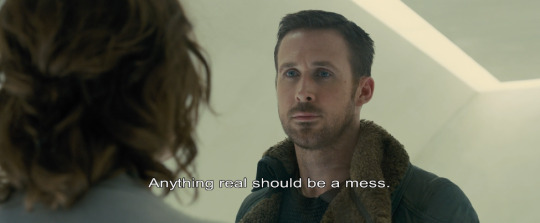
Especially the last two lines, "We recall with our feelings. Anything real should be a mess."
Linking back to Hunter, it would be a tough process to learn how to make peace with his childhood with Belos. Because anything that felt real would be a mess.
And K has a similar line as Yelena did:

The running theme I spotted is the realness of confusing memories for these characters, because their inner conflicts involve questioning themselves: whether or not they were just imagining the good feelings they felt.
While we never got confirmation whether Belos used false memories or not, I'm inclined to think he didn't...in order to work more subtly and over a long period of time on Hunter as his latest grimwalker project. The deadlier lies are the ones with many bits of truth scattered throughout their intricate webs, like what the memory maker in Blade Runner 2049 could pull off.
Belos's treatment would've felt kind to Hunter at the time. As they say, how we feel about any experience we have is "what we make of it". Or how we choose to view the experience.
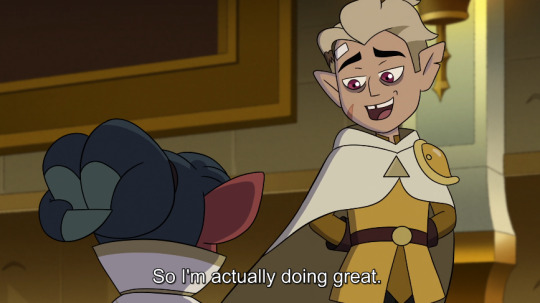
I think Hunter needed to believe his uncle really was kind, while maintaining his own image, in order to keep going and survive.
This tragically meant he had to believe he wasn't doing enough.
It is always scarier for an abused child to see that their parent in fact isn't loving after all/isn't a good person, compared to imposing shame upon themselves and believing they aren't good enough.
Of course, all this would've changed by the time we get to here and beyond:
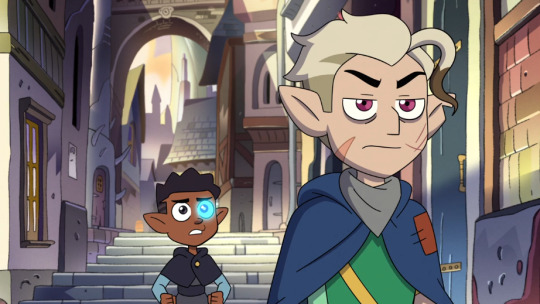
Memory is subjective and our minds are so powerful that they find evidence to seemingly confirm any kind of beliefs that we form.
All three characters in this post were cogs in a machine, reduced to being pawns in a scheme...until they later had the space to decide things for themselves.
As seen in Hunter's efforts in his Golden Guard days to be good enough in the role, Yelena taking a stand to preserve the purity of an untainted childhood (even if it was staged and not organic), K defying authority to cross a line in his duties and get answers about who he was....this is how much we as humans will clamber to grasp onto a sense of personhood, to give our lives meaning and survive the best we can.
Yelena wanted to preserve the memories of her childhood as good, as a haven or a warm fuzzy bubble to look back on, because it got torn apart before she reunited with her family many years later.
Obviously Hunter can't do exactly the same i.e. preserving the entirety of his time in the Castle as "good", since he has now been able to see that Belos was a constant threat upon his life. However, he could still look back on smaller pockets of his childhood as pleasant, by isolating those specific memories.
We have two examples in canon: the way he grins when remembering the experience of being left on top of the mountain and climbing back down. And him saying that "weekends were nice" since he tasted partial freedom by being outdoors going on missions.
In fact, he would likely start out wanting to erase his childhood, view it as entirely bad and terrible to revisit, and try to force himself to forget its significance and start afresh. But this would only worsen the unpleasant emotions associated with this time of his life that he'd rather wish had not existed.

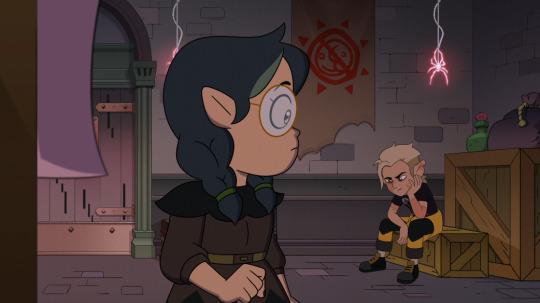
Mental health recovery is counter-intuitive: avoiding or denying emotions tend to make them grow bigger and scarier, while letting them feel seen and heard can help them along to shrink and positively transform over time. Hunter's therapist would have to provide him with psychoeducation on this so that he doesn't feel like he's grieving wrongly. It would bring him more peace if he can acknowledge both of these seemingly conflicting truths:
Factually, Belos did lie to him and betray him.
(Here's the important part) Emotionally, if the 'kindness/love' offered by Belos felt real at the time, received by Hunter's very legit need for attachment and meaning, then yes, it was real.
Both these points can coexist. Belos's love was untrue in the factual sense (we in the audience can easily see this), yet true in the emotional sense for a young child like who Hunter was. Which is what makes it hard.
Someone would ask Hunter, "Do you think he loved you?" and the answer isn't simple. Maybe it'd be something like "He didn't, but I felt like he really did." And the second half of that sentence ("but I felt like he really did") honestly doesn't need to be changed or removed, and the grief in those words should be honoured. Belos only cared about meeting Hunter's emotional needs as a means to an end, and as strange as it sounds to say this...it did help Hunter survive long enough, however mistreated he was. Because he still clung on to meaning and a purpose in his life.
The love wasn't there in the technical sense: instead it was a twisted version of Philip's love for Caleb, not any love extended towards Hunter. But this love still felt mostly real to Hunter before he fled the coven.
And I bet that even if it was for a split-second, Belos's gaslighting of "Why are you hurting me? I only wanted to help you" felt real and true to the poor kid here:


before Hunter expressed that he knew who Belos truly was as a person: a liar.
#toh hunter#the owl house#toh analysis#loz writes a meta#another spontaneous meta after I watched Blade Runner 2049 today#I keep writing about my little baby and I ain't sorry#abuse mention#trauma mention
339 notes
·
View notes